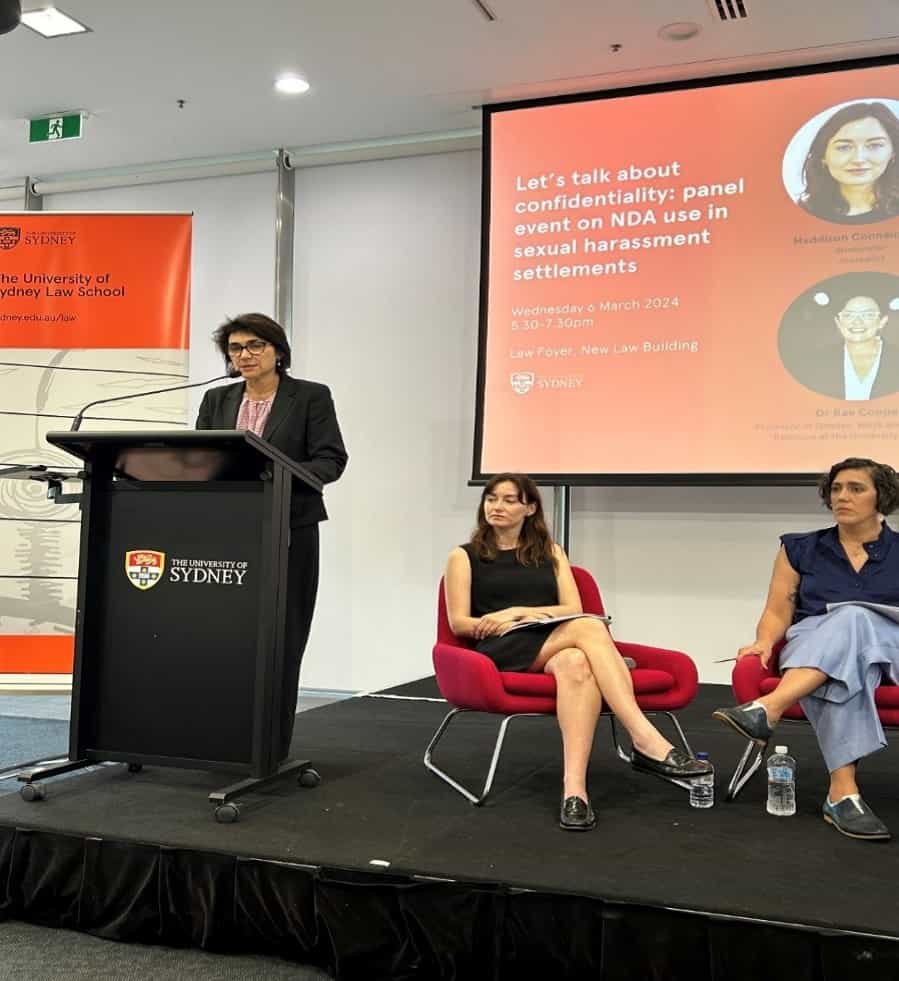A recent seminar at the Sydney Law School considered the use of non-disclosure agreements (NDAs) in sexual harassment settlements.
The seminar discussed the Let’s Talk About Confidentiality: NDA Use in Sexual Harassment Settlements Since the Respect@Work Report[i] authored by Regina Featherstone from the Human Rights Law Centre and Sharmilla Bargon from the Redfern Legal Centre. The research was the product of Ms Featherstone and Ms Bargon’s work in the law school as Social Justice Practitioners-in-Residence.
The Let’s Talk About Confidentiality research raises important questions in the context of the ongoing conversation about sexual harassment in Australian workplaces following the publication of the Australian Human Rights Commission’s Respect@Work: Sexual Harassment National Inquiry Report in 2022 (Respect@Work).[ii]
Ms Featherstone and Ms Bargon surveyed 145 legal practitioners across Australia with experience managing sexual harassment matters. They found that:
These findings follow the use of NDAs being considered by the Australian Human Rights Commission (Commission) in Respect@Work. The Commission heard evidence that NDAs can protect the privacy of victim/survivors and help provide ‘closure’ but also ‘protect the reputation of the business or the harasser and contribute to a culture of silence.’
The Commission recommended (in Recommendation 38) that it work with the Workplace Sexual Harassment Council (SHC) to ‘develop a practice note or guideline’ identifying ‘best practice principles for the use of NDAs in workplace sexual harassment matters to inform the development of regulation on NDAs.’
The Commission and the SHC published Guidelines on the Use of Confidentiality Clauses in the Resolution of Workplace Sexual Harassment Complaints in 2022 (Guidelines).[iii] The Guidelines recommend among other things that:
The Guidelines provide practical advice to practitioners about the use and misuse of NDAs and about how settlement negotiations can adopt a best practice approach to balance the needs of victim/survivors and the requests of respondents and achieve a resolution.
Let’s Talk About Confidentiality builds on the practical advice contained in the Guidelines by including model confidentiality clauses that can be adapted to individual circumstances. The report is careful to recognise the potential use of the model confidentiality clauses while stating that they ‘should not automatically be included in a settlement agreement.’
The seminar included a panel discussion.
Mia Pantechis, a Principal Lawyer at Maurice Blackburn, and Amanda Lyras, a partner at Clayton Utz, provided the perspectives of practitioners experienced in representing applicants and respondents. Ms Pantechis and Ms Lyras agreed that NDAs may play a role in settling sexual harassment complaints and that an individualised approach sensitive to the needs of victim/survivors is necessary.
Key take home messages
Regina Featherstone and Sharmilla Bargon have published contemporary, relevant and thought-provoking research and practical guidance to assist those who are involved in sexual harassment complaints.
The research adds to growing recognition that workplace sexual harassment is common and that employers have obligations to respond in protect the interests of victim/survivors.
One size rarely fits all. This is true of resolving sexual harassment complaints.
Approaching the settlement of sexual harassment complaints from a victim-centric perspective that considers if a non-disclosure agreement is used, and if used in what terms, is one means of further ensuring the progress that Respect@Work called for.

Get in touch
Centium’s Principal Investigator Scott Fanker attended the Let’s Talk About Confidentiality seminar.
Scott is experienced in managing sexual harassment from the perspectives of an employer, mental health clinician, and an investigator. He is leading Centium’s work to implement our sexual harassment policy and other actions to meet the new positive duty to eliminate sexual harassment and discrimination contained in section 47 of the Sex Discrimination Act 1984 (Cth).
Scott can be contacted on 0499 187 804 or at Scott.Fanker@centium.com.au
References
[i] Regina Featherstone and Shamilla Bargon, Let’s Talk About Confidentiality: NDA Use in Sexual Harassment Since the Respect@Work Report (2024, University of Sydney Law School) <https://rlc.org.au/sites/default/files/202403/Let%27s%20talk%20about%20confidentiality%20final_0.pdf>.
[ii] Australian Human Rights Commission, Respect@Work: Sexual Harassment National Inquiry Report (2020, AHRC) <https://humanrights.gov.au/our-work/sex discrimination/publications/respectwork-sexual-harassment-national-inquiry-report-2020>.
[iii] Australian Human Rights Commission, Respect@Work, Guidelines on the Use of Confidentiality Clauses in the Resolution of Workplace Sexual Harassment Complaints (2022, AHRC) < https://www.respectatwork.gov.au/sites/default/files/202212/Guidelines%20on%20the%20Use%20of%20Confidentiality%20Clauses%20in%20the%20Resolution%20of%20Workplace%20Sexual%20Harassment%20Complaints.pdf>
Our Clients